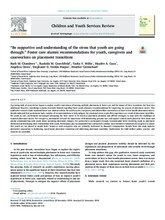Abstract
A growing body of research has begun to explore youth’s experiences of moving multiple placements in foster care and the impact of these transitions that lasts into adulthood. However, knowledge remains extremely limited regarding foster youth/alumni’s recommendations for improving the process of placement moves. This qualitative research study examined foster care alumni’s advice for youth in care, caregivers, and child welfare caseworkers on how to best handle placements moves. Results indicated that participants had a number of recommendations to help mitigate the emotional stress youth often experience as a result of placement instability. For youth in care, participants encouraged advocating for their voices to be heard in placement decisions and offered strategies to cope with the challenges of repeated placement moves. For caregivers, participants stressed the importance of demonstrating genuine care and support toward youth placed in their home and openly communicating with youth about upcoming placement changes. For caseworkers, participants strongly recommended better involving youth in placement decisions and developing close relationships with youth. Participants also recommended that caseworkers conduct more intensive evaluations of caregivers to ensure that youth are not placed in unsafe foster homes or with caregivers who are primarily motivated by financial compensation. Results from this study indicate alternative approaches to facilitating out-of-home placement transitions and addressing placement instability. Implications for child welfare policy, practice, and research are provided.
View article here.

